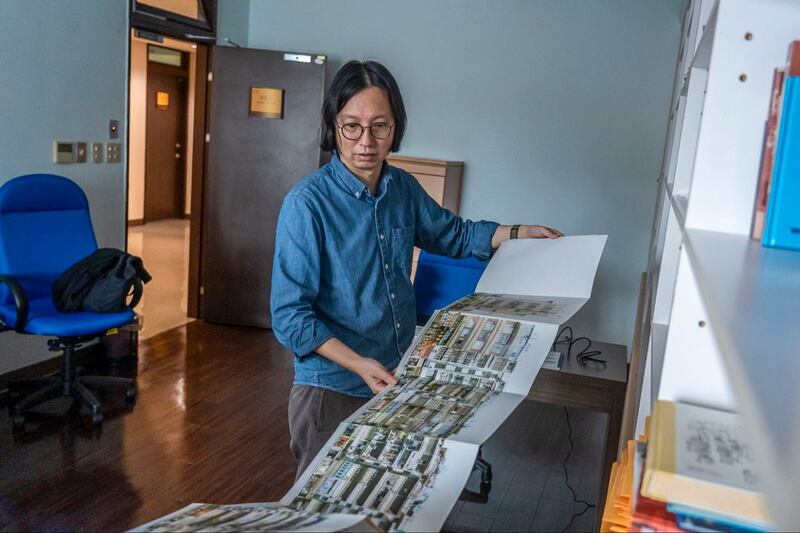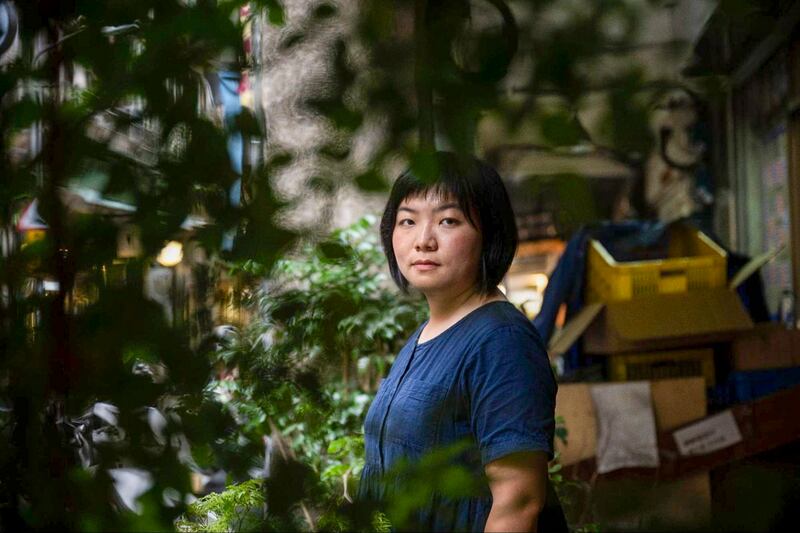Writer Carpier Leung can remember when his Q&A format book "Hong Kong 101" was given a whole table to itself at the Eslite chain of bookstores when it came out in Hong Kong a few years ago.
Published in 2020, the book offered a handy introduction to questions of changing identity, institutional challenges and social issues in the former British colony over the past century. So much so that it was adopted as a textbook by many schools.
"Nowadays, that is completely unthinkable," Leung said. "It can't even go on public sale now."
Hong Kong's bookstores once drew Chinese-language bibliophiles from far and wide in pursuit of some of the city's most off-beat, salacious and politically radical writings, coupled with cute or alternative takes on art and culture -- like Leung's photo essay on the city's iconic housing estates titled "The Call of the Grid."
But even before the 2020 National Security Law ushered in a crackdown on public criticism of the authorities, the Chinese government had been positioning itself to take control of the city's main publishing imprints and bookstore chains, squeezing out dozens of independent stores as it did so.
And as the political crackdown gathered momentum, libraries made lists of books likely to run afoul of the new law, and pulled them from the shelves.
‘War on libraries’
In what some dubbed a "war on libraries," titles addressing the 1989 Tiananmen massacre, as well as books written by jailed protest leader Joshua Wong and Occupy Central movement founder Benny Tai, started disappearing from public view.
And as people were actively encouraged by police to inform on any words or deeds that could be deemed subversive under the law, bookshores and publishing houses were also engaging in self-censorship.

Many writers and booksellers left the city for fear of arrest, or to seek a freer environment in which to work. Democratic Taiwan, with its educated readership and use of traditional Chinese characters, was a natural home for many Hong Kong literary folk.
"Hong Kongers are dispersing, and so are their books," according to Chuang Jui-lin, Leung's editor at Taiwan's SpringHill Publishing. "Local Hong Kong publications have managed to survive in the political wilderness."
Hong Kongers were a highly visible minority at this year's Taipei International Book Fair, with many of their latest offerings happily published by the Hong Kong departments of major Taiwanese publishing houses.
Nostalgia and memory are a constant theme for this segment of the market, Chuang said.
"I have the very strong impression that, regardless of their political stance, many of my Hong Kong friends are working to preserve [memories and a connection to Hong Kong]," Chuang said. "This is being done very meticulously."
Chuang said even a Hong Kong Cantonese dictionary has been selling well.
"Everyone seems to feel that buying a book like that, even if they just keep it at home, is a form of support," she said, citing non-fiction works about Hong Kong's bird-keeping tradition, including birdcage craftsmanship.
"Even the tiniest thing can be turned into a book, because it's like a magnification of memories. Readers are keen to just look at such detail," she said, adding that Leung's book on public housing is a good example, because it captures "many details of Hong Kong."
Sea change
One of the reasons Leung's book can't be sold in Hong Kong any more is the way he folds in the city's social and political history with beautiful photography of its housing estates.
Once considered a safe seat for pro-establishment candidates in District Council elections, the housing estates were often cut off from the concerns of Hong Kong's educated middle classes, who typically took to the streets in downtown Hong Kong Island, more than an hour's trip away from the housing projects of Tuen Mun or Wong Tai Sin.
But in 2019, everything changed, Leung said, and local people turned out to resist plans to extradite alleged criminal suspects to mainland China, and later to demand fully democratic elections.

"The young people in particular felt that they wanted to protect the place where they grew up, and those feelings and sense of identity just came pouring out," he said. "But how could a Hong Kong reviewer talk about such things? I found that this book could only be published in Taiwan."
It hasn't always been this way. Hong Kong publishers once rushed to publish books about the 2014 Occupy Central movement.
But by 2019, the Chinese authorities had decided that the lack of "patriotic education" in the city's schools was the reason for recent waves of mass popular protest, and imposed the National Security Law on the city, while abolishing the Liberal Studies curriculum and replacing it with classes on patriotic feeling and " national security" from kindergarten to university.
For Huang Hsiu-ju, editor-in-chief of Taiwan's Rive Gauche Publishing House, publishing works by Hong Kongers about Hong Kong is a way to resist totalitarianism.
"The Hong Kong experience has been there all along, but we have just been too focused on ourselves and didn't realize how important it was," said Huang, who has published 13 books on Hong Kong issues so far.
Blank boxes
One book, a memoir of Occupy Central founder Chu Yiu-ming, bears the scars of the Hong Kong crackdown openly, offering up 16,000 blank boxes in lieu of Chinese characters in a chapter that the pastor feared could turn into evidence against him at his trial.
But Huang persuaded Chu to persevere with the rest of the book.
She remembers telling him: "If you don't write it, then it's gone, and the things that should be remembered will disappear."
Eventually, she and the art director assuaged Chu's concerns by "censoring" parts with blank boxes, a choice that echoes the blank sheets of the 2022 "white paper" protests, Huang said.

Rive Gauche's best-selling books are both about the 2019 protests. Published in 2020, they have sold around 9,000 copies each, and while sales have slowed in recent months, they have not dried up entirely.
What Rive Gauche is doing in non-fiction, author Leung Lee Chi and Ho Kwun-lung, editor-in-chief at Taiwan's ECUS Publishing House, are doing for literary works by Hong Kongers.
Leung Lee Chi's next novel "Everyday Movement" will soon be translated into English, offering up 10 short stories depicting Hong Kong in 2019 for an international audience.
"Winning literary awards or publishing books in Taiwan seems to be where the future of Hong Kong writing lies," she said, adding that she has long wanted to be published in the island, which is home to many of her literary heroes.
‘Red lines’
Leung, 29, fled Hong Kong in 2021 after Everyday Movement ran into censorship issues with the original publisher.
"There were a lot of sensitive passages in my manuscript," she said. "I wanted to know if it was OK to refuse revisions suggested by the publisher."

When the reply came that her editor wasn't even sure about where the political "red lines" lay, Leung took a plane to Taiwan and carried on writing in the coastal county of Hualien.
Her Taiwanese editor Ho has worked with a few emerging Hong Kong authors in recent years, and is considered part of a new generation of Taiwanese publishers who care about Hong Kong.
"When I started working on these books, I didn't have a preconceived idea that I would focus on literature from Hong Kong," he said. "My approach was that of an author who is working on a good novel, which I hoped readers in Taiwan would enjoy reading."
For Carpier Leung, it's about a unique voice that is still coming out of Hong Kong, despite the censorship back home.
Writing in the postscript of his book on public housing estates, Leung comments: "After visiting all the big housing estates in Hong Kong, my strongest impression was probably that ... speaking is hard, but we still have to find a way to do it."
"Finding out how to do that, and how to let more people speak too, is part of our task as human beings."
As for all the books about everything from siu mai and egg waffles to hiking trails and architecture, Chinese-character fonts and local crafts, he's pretty sure where it's all coming from.
"I would say that everyone is looking for a safe way to express their love for Hong Kong," he said.
Translated by Luisetta Mudie. Edited by Malcolm Foster.
